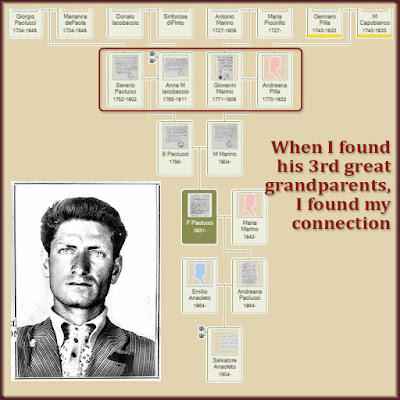Take your time and you can overcome bad handwriting and unfamiliarity.
I have a DNA match with a connection to the least-explored branch of my family tree. I haven't known about this branch very long. I found out they came from a new-to-me Italian town called Apice (a peach, eh?). But I didn't do much more than look up the immediate family of my 3rd great grandmother.
Meanwhile, my DNA match has been busy adding nearly everyone from this town to his family tree. He's creating a document of the town—piecing together families even if they're not related to him. Thanks to his exploratory tree, I discovered the names of 2 sets of my 6th great grandparents!
I knew I had to start treating this town the same as I treat my other ancestral towns. There are a ton of the town's vital records available on the Italian Antenati website. I've downloaded lots of them, but I haven't finished.
Even before I download all of them, I want to go through the files I have and look for my ancestors' last names:
- Lomaglio
- Lorito
- Mazzarella
- Montenigro
- Trancuccio
- Zullo
So I started renaming the image files from Apice as I viewed them. (By editing the file name to include the name of the person in the document, it becomes searchable on my computer.) From the very start, I had a major stumbling block. The handwriting was awful!
 |
| My knowledge of Italian names helps, but I needed to see it written clearly. |
That's when I remembered my tips for working with a set of hard-to-read documents:
- Examine as many records as possible. The more times you see a name written, the greater your chances of seeing it written clearly.
- Take your best guess. I renamed the Apice vital records for 1809–1811. When I couldn't quite read a name, I typed my best guess. When I see a guessed name enough times, and I figure it out, I can go back and correct all my guesses.
- Find documents with better handwriting. The town clerk won't have kept his job forever. I jumped way ahead to the 1844 death records, and the handwriting was large and clear. A new town clerk was on the job! If you find documents with good handwriting, study them to learn the names of people in this town.
As I rename the files, I keep my family tree open. Each time I find a Zullo document (or any of the other names in my list), I check to see if they can fit in my tree yet. I'm eager to find death records for my 5th great grandparents, Saverio Zullo and Angela Montenigro, so I can learn their parents' names. They may have died before 1809 when Italy began keeping civil records. But there's a chance I'll find them.
 |
| Renaming my files made the town's names clearer to me: Casazza, Caporaso, Licciardi, Iebba… |
I started an alphabetical list of the last names in this town. I'm adding them to an Excel file as I find them. (I can sort it alphabetically in 2 clicks.) That way I can remember what I decided is the proper spelling of each name. This has been tremendously helpful when I find a name that written so badly.
When we've got these endless, entertaining puzzles to play with, who wants to go outside? Seriously, though, get the hell in your house!
















